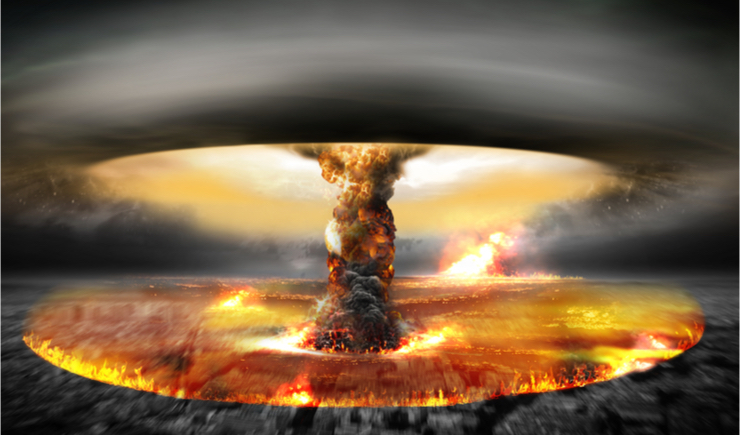The giddy expectation of Russia’s collapse that accompanied the brief mutiny by Yevgeny Prigozhin’s Wagner PMC Group against Vladimir Putin seemed to forget a simple fact about the former USSR: it’s loaded with enough nuclear weapons to destroy the world. If Russia’s political situation destabilizes and becomes uncontrolled, who knows what could happen to its arsenal of weapons of mass destruction? Christopher Clary explains the situation at Foreign Policy:
When the Wagner Group’s rebellion against the Kremlin unraveled, many commentators welcomed the prospect of Russian unrest and potential regime change as a way of complicating Russia’s war in Ukraine. In reality, however, the United States likely dodged a bullet when this uprising failed to topple Russian President Vladimir Putin. Though a weakened Russia might struggle to sustain its operations in Ukraine, political turmoil in a nuclear-armed state has historically given Washington good cause for hand-wringing, sparking fears about the stability and security of foreign nuclear arsenals. And even though Russia takes considerable steps to secure that arsenal in peacetime, the sheer size of its nuclear weapon and fissile material stockpile leaves it open to major risks. The Wagner Group crisis may be in the rear-view mirror for now, but as Washington contemplates future challenges to Putin’s authority, it ought to tread carefully. Russian political turmoil might be good for Ukraine today but awful for other U.S. priorities in the near and distant future.
Political instability in nuclear-armed states is more common than one might think. Of the 10 states that have developed a nuclear weapon, seven—France, China, the Soviet Union, South Africa, North Korea, Pakistan, and India—have experienced serious political turmoil in the form of coups or coup attempts, regime changes, civil wars, or other forms of widespread domestic instability. Lest anyone in Washington be too quick to judge others, the recent record of political stability in the United States is far from exemplary.
Domestic instability in nuclear states tends to scare foreign governments—and for good reason. In the nuclear age, no one wants ambiguity over who has authority over decisions to use or deploy nuclear weapons. Most states have announced publicly who has this authority in peacetime and crisis conditions, but domestic instability can render these procedures irrelevant, leading insiders and outsiders to fear the worst.
The canonical example is the Soviet Union. As Soviet political authority imploded in the early 1990s, punctuated by the August 1991 coup attempt against President Mikhail Gorbachev, there were pervasive fears that Soviet nuclear command and control procedures would unravel in chaotic fashion and undermine the U.S. ability to assess Soviet nuclear behavior. Following the collapse of the Soviet state in December 1991, Soviet nuclear weapons and material were scattered across four newly independent states—Russia, Kazakhstan, Belarus, and Ukraine—leaving U.S. policymakers scrambling to make sense of nuclear decision-making in a fluid security environment and to develop diplomatic, military, and economic tools to minimize the risk of crises.
Even when events threaten to topple an adversary, foreign-policy makers tend to worry that a replacement might be even worse than the leader or regime they know. For example, despite having started the Korean War in 1950 and fighting against the United States, when North Korean leader Kim Il Sung died in 1994, many U.S. officials feared his successor, Kim Jong Il, would be worse. William Perry, then the U.S. deputy defense secretary, went so far as to argue that before the elder Kim’s death, a primary goal of U.S. policy was to prevent North Korea from developing a nuclear arsenal in case a power transition turned violent. “This is a government which has clearly failed and in my opinion is going to collapse sometime in the next few years,” Perry said in 1993. “Our concern is, if it goes out with a cataclysm, we don’t want it to be a cataclysm with nuclear weapons.”
Equally disconcerting is the risk that political instability could lead to civil war and what former U.S. Secretary of State James Baker once called “Yugoslavia with nukes.” The problem here is both ambiguity over who controls a nuclear arsenal and the possibility that rival factions might deploy nuclear weapons against competitors. During a coup attempt in France in 1961, the coup plotters attempted to delay a scheduled French nuclear weapons test in Algeria. One of the plotting generals instructed the general responsible for the nuclear explosive device: “Refrain from detonating your little bomb. Keep it for us—it will always be useful.” After the plot fizzled, several members of the nuclear test team commented that they believed the plotters sought the device as a bargaining chip to blackmail Paris.
Meanwhile, because domestic instability by definition undermines law and order, it raises the risk that nuclear technologies will be lost, stolen, or diverted and imperil counterproliferation efforts. When South Africa’s apartheid government faced growing domestic unrest in the late 1980s, a major impetus behind U.S. engagement with the noxious white-minority government was the desire—driven to some extent by overblown fears of what Black-majority rule might mean—to prevent South African nuclear assets from spreading beyond its borders. The available evidence indicates that U.S. policymakers were “extremely concerned about the possibility of Pretoria’s nuclear capability falling into the hands of an irresponsible government with links to communist and extremist Islamic countries,” scholar Anna-Mart van Wyk writes.
Such worst-case scenarios have not come to pass, but the potential is real. Because these risks are so stark, foreign governments have tried to find ways of mitigating the dangers. But the options for confronting the collapse of a nuclear state are limited.
Read more here.
If you’re willing to fight for Main Street America, click here to sign up for the Richardcyoung.com free weekly email.






